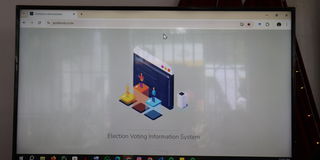Electronic voting system digitizes elections for Nakuru's Universities

The Electronic Voting Information System (EVIS) designed by Kabarak University.
Elections are extremely complicated processes that provide many difficulties with logistics.
Although they are integral to the democratic process, they can also harm the environment.
Campaign materials like posters and flyers are used for a short time and then disposed of as waste products after the election.
As such, a shift towards social media and digital voting could cut down on paper and plastic waste.
Well, this is not a far-fetched dream as students from Kabarak University have pioneered and devised an electronic voting system.
The system christened the Electronic Voting Information System (EVIS) is an electronic-based system for conducting elections and recording votes digitally with instant results tallied at the end of the voting day.

Hope Mwangi, third year Computer Science student from Kabarak University.
Hope Mwangi, a third-year Computer Science student, believes that ‘green’ voting is sustainable in the long run as it reduces paper usage.
“"Electronic voting is an environmentally friendly option that reduces the use of paper ballots and promotes voting from a distance. When students vote from their distant locations, it does not require them to travel to polling stations thus reducing their carbon footprint,” she notes.
The system creates an election with candidates’ data including their photos and voters’ data. On election day, the system prompts the back-end user to select the opening and closing time. Simultaneously, it generates a link sent to voters who then are at will to cast a vote during the specified period.

Part of the interface on the Electronic Voting Information System (EVIS).
Ms Mwangi highlights that the system is also friendly to users without a smartphone as they can do the same using a USSD code.
Dr. Moses Thiga, who is overseeing the research and is a Senior Lecturer of Computer Science and ICT, notes that this revolutionary research has been able to help Kabarak University cut down administrative costs by 27 percent.
“The idea behind this innovation stemmed from observing the increasing student population at the university and the rising logistical and administrative costs of manual elections,” Dr. Thiga explains.
“We asked ourselves, ‘How can we help reduce the institution's budget? That's how EVIS was born. Through it, we've been able to reduce our election budget by 27 percent, as it eliminates the need for polling stations, voting papers, ballot transportation, and other traditional election expenses.”
In addition to this, he notes that the school has been able to increase voter turnout including the participation of voters who may have not been physically present on campus on voting day.
“The system, which has been in operation for five years now, has also been used at Egerton University to conduct elections”, confirms Dr. Thiga.
“While we've primarily implemented the system in learning institutions, it can also be deployed to accommodate organizations that do elections like Saccos, unions, and church societies, among others. In short, it can cater to all types of elections,” he says.
When asked about the future of the innovation, Dr. Thiga reveals their plans towards commercialization emphasizing their goal to provide a convenient way to conduct elections.
